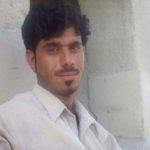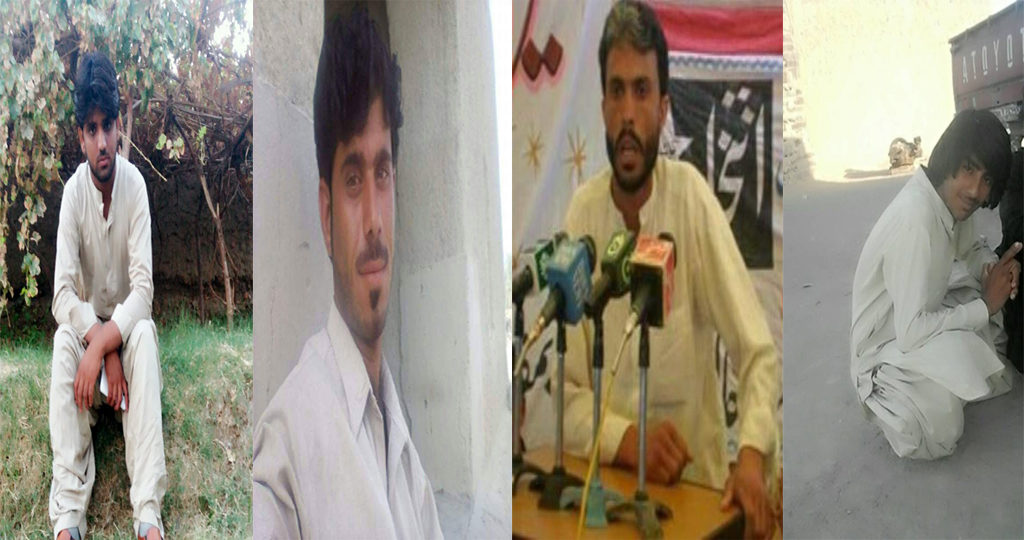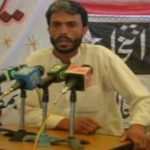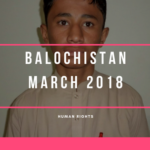Pakistan’s security forces have abducted 32 persons, including teenagers and students, from Washuk, Kharan, Panjgur and Kech districts of Balochistan.
On 11 April, security forces conducted a military operation in Beront area of Balgetar, district Kech, Balochistan and abducted three brothers, Hatim, Maqbol and Azim Murad Bakhsh.
On 09 April 2018, personnel of intelligence agencies raided Omari Kahn area of district Kech, Balochistan and abducted two students, Qasim Swal Jan and Jalal Murad.
On the same day, forces started a search operation in Jattani Bazar, Dasht district Kech, Balochistan and abducted Fida Dost Mohammad and 60 years old Murad Jan Mahmud. Fida’s daughter Samreen was killed last year during a military operation in the same area.
Separately, forces abducted Younis Shambay, resident of Bal Negwar, Dasht, district Kech, Balochistan on the same day.
On 08 April, forces raided a house in Dalsar area of Dasht, district Kech, Balochistan and abducted Sanni Barkat from his house.
On the same day, security forces abducted Waris Ghafoor and 12 years old Abdullah Hidayat during a military operation in Jan Mohammad Bazar, Dasht district Kech of Balochistan.

Separately, personnel of security forces and intelligence agencies raided the house of Haji Gazzi in Panjgur town of Balochistan and abducted a student, Sana Jan Khair Jan, resident of Soler Tobah, Pashtkoh, Balochistan.
On 06 April, forces opened fire on civilians in Singabad area of Tijaban in Turbat, district Kech,
Balochistan. Hassan Dur Mohammad was shot in the leg and then abducted along with Qambar Murad and Majeed Salim.

On the same day forces abducted an eighth grade student, Kamran Noor Bakhsh, resident of Menaz, Buleda, district Kech, Balochistan.
According to locals, Pakistan military sponsored death squads abducted Hanif Aslam and Naim, resident of Khairabad, district Kech, Balochistan on 08 April 2018.
On 04 April, forces raided Jabir’s house in Rodbun, Tump district Kech, Balochistan and abducted Naseer, resident of Tagranabad, Tump, district Kech.
On 03 April, Amanat Hasrat, a famous poet also known as G R Shari was abducted by forces from Ahmedwal check-post in Kharan, while he was returning from Islamabad to his hometown. He was a student at Alama Iqbal Open University Islamabad. He was also a social media reporter of Rakhshan News and a member of a local literary group “Sangat Library” Kharan, Balochistan.
Separately, Forces abducted 14 years old Saleem Murad from Panjgur, Balochistan. He is an eighth grade student, resident of Kaor-posht, Buleda district Kech.
On 02 April, forces abducted Dr. Muhim Jan during a raid in Taloi Rind Bazar, Dasht district Kech, Balochistan.
On 01 April, security forces abducted Munir Faqir Mohammad from Balgetar, district Kech.
On the same day, the Balochistan Liberation Front, one of the main separatist militant groups operating in Balochistan, claimed responsibility for killing Iqbal Swali, a resident of Hoshap area of district Kech. The group said in its statement that Iqbal had previously been part of the group but later surrendered to the military. The statement further said that the BLF militants abducted him and sentenced him to death after he confessed to collaborating with the military.
Jameela Swali who was the sister of Iqbal Swali was shot dead by unknown gunmen in her house on the same day. However, BLF denied a role in her killing and condemned the incident.
On 30 March, forces abducted Alim Haji Amam, resident of Nondada district Awaran, Balochistan.
On 29 March, forces raided a house and abducted Ahmed Ali Usman from Tump district Kech, Balochistan.
On the same day, forces abducted Saddam Sabzal and Zubair Mulla Fida from Nezrabad, Tump district Kech, Balochistan. Both are residents of Malikabad, Tump district Kech, Balochistan.
On 27 March, Mansur Usman, resident of Gomazi, Tump was abducted by forces during a search operation in Cheri Bazar of Gomazi, Tump district Kech Balochistan.
On the same day, forces abducted Yasir s/o Nasir from Kalero, Dasht district Kech, Balochistan.
On 25 March, forces abducted Abdul Malik and Abdul Majid from Kella Deg area of district Kharan, Balochistan.
On the same day, Forces abducted Washdil Amir Bakhsh, from Chitkan Bazar, district Panjgur, Balochistan. He is the resident of Syah Dumb, Gichk district Panjgur, Balochistan.
All the abductees have been shifted to unknown locations and their whereabouts remain unknown to their families.
The Pakistan military adopted a policy of enforced disappearances to stifle the Baloch peoples struggle for their political and economic rights. Since 2005, thousands of Baloch activists, poets, students, rights activists and others have been forcibly disappeared. The military keeps their whereabouts unknown and subjects them to torture for months.
In 2009, the situation got worse. The Pakistan military abducted three key Baloch leaders, including Ghulam Mohammad Baloch who was the President of the Baloch National Movement (BNM), from the Turbat city of Balochistan on April 3, 2009. In a week, on April 9, their tortured and bullet-riddled bodies were found dumped near the Turbat city. It was the beginning of the military’s now infamous kill-and-dump operations, in which they abduct political activists, journalists, educationists, student activists and human rights defenders, and later dump their bodies in desolated areas.



